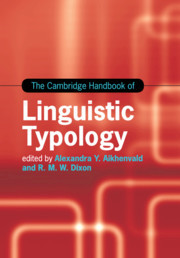The Cambridge Handbook of Linguistic Typology Cambridge Handbooks in Language and Linguistics Series
Coordonnateurs : Aikhenvald Alexandra Y., Dixon R. M. W.

R. M. W. Dixon is Professor and Deputy Director of the Language and Culture Research Centre at James Cook University, North Queensland and a Fellow of the British Academy. He has published grammars of a number of Australian languages.
Date de parution : 04-2020
Ouvrage de 1026 p.
16.9x24.3 cm
Disponible chez l'éditeur (délai d'approvisionnement : 14 jours).
Prix indicatif 62,44 €
Ajouter au panierDate de parution : 03-2017
Ouvrage de 1026 p.
18.5x25.5 cm
Disponible chez l'éditeur (délai d'approvisionnement : 14 jours).
Prix indicatif 175,79 €
Ajouter au panier


